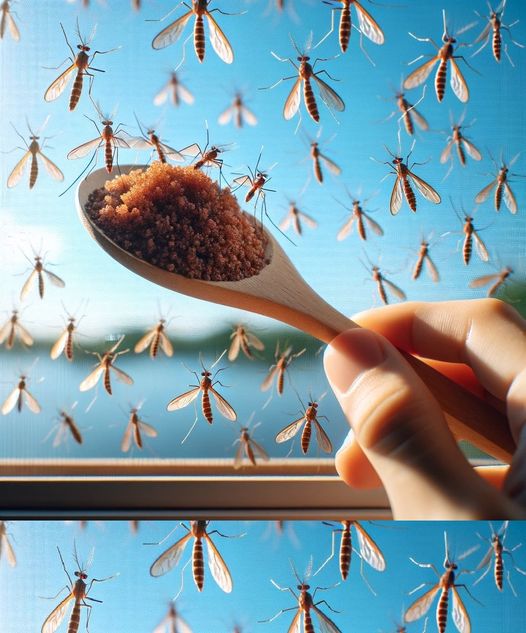As the seasons change and warm weather sets in, mosquito populations begin to swell, bringing with them the incessant buzz and the threat of disease. These pests, known mainly for their itchy bites and the risk of transmitting serious illnesses such as malaria, dengue fever, and West Nile virus, can quickly turn outdoor enjoyment into a nightmare. While there are numerous commercial insecticides available, many harbor toxic chemicals that can be harmful not just to insects but also to pets and humans. But what if we told you that the most powerful insecticide against mosquitoes could potentially be found right in your kitchen pantry? Here’s a closer look at how you can create effective, natural insect repellents at little to no cost using items you likely already have at home.
Understanding the Mosquito Menace
Before diving into homemade solutions, it’s essential to understand why mosquitoes are such a problem. There are over 3,500 species of mosquitoes, but only a few hundreds are known to bite humans. The female mosquitoes are the ones that feed on blood, requiring proteins and iron for their eggs. Their appetite for blood is driven by environmental factors, such as temperature and carbon dioxide levels, which humans naturally emit.
Additionally, mosquitoes are attracted to certain scents, particularly carbon dioxide, sweat, and even some lotions or perfumes. This makes some individuals more prone to mosquito bites than others. The resulting itchy welts aren’t just a nuisance; mosquitoes can carry pathogens that lead to life-threatening diseases. Given this, reducing mosquito populations around your home becomes a crucial aspect of health and comfort.
Natural Alternatives: The Kitchen Solutions
Instead of resorting to chemical sprays, consider tapping into your kitchen supply for effective mosquito deterrents that are safe and eco-friendly.
1. Vinegar as a Mosquito Repellent
Vinegar, particularly apple cider vinegar, is a well-known household ingredient with insect-repelling properties. The strong odor of vinegar confuses mosquitoes, which rely heavily on their sense of smell to locate sources of blood. Here’s how to use it:
How to Use:
- Mix equal parts of apple cider vinegar and water in a spray bottle.
- Add a few drops of a citrus essential oil (like lemon or orange) for added potency and a pleasant fragrance.
- Spray around your body and on outdoor furniture or your patio to repel mosquitoes.
2. Garlic: Nature’s Insecticide
Garlic is another kitchen staple that mosquitoes find repulsive. Consuming garlic can make your skin emit a scent that deters mosquitoes. Furthermore, a garlic spray can be used in the garden to keep these pests at bay.
How to Use:
- Crush several cloves of garlic and steep them in water for a few hours or overnight.
- Strain the mixture and add a few drops of dish soap to help the solution stick to surfaces.
- Spray this mixture around your garden or on your skin (if you don’t mind the smell) for a natural repel.
3. Essential Oils: The Powerhouse Protectors
Essential oils, which are concentrated extracts from plants, are incredibly effective at repelling mosquitoes. Many common kitchen herbs have essential oils with repellent properties.
Top Essential Oils:
- Peppermint Oil: Known for its strong scent, it can repel mosquitoes effectively.
- Cinnamon Oil: Research shows that cinnamon oil can kill mosquito eggs and repel adult mosquitoes.
- Lavender Oil: Not only does it smell wonderful, but it also has insect-repelling properties.
How to Use:
- Mix a few drops of your chosen essential oil with a carrier oil (like coconut or olive oil) in a spray bottle.
- Apply to exposed skin or lightly spritz around your home and garden.
4. Citrus Peels: A Natural Deterrent
Mosquitoes dislike citrus scents, so using citrus peels can be an effective way to deter them.
How to Use:
- Place citrus peels (like lemon, lime, or orange) around your outdoor sitting area or any nooks where mosquitoes tend to gather.
- Alternatively, you can simmer citrus peels in water to release their oils into the air and create a naturally scented mosquito repellent.
5. Coffee Grounds: A Dual-Purpose Approach
If you’re a coffee drinker, you can also use spent coffee grounds to combat mosquitoes. Coffee’s strong scent not only deters mosquitoes but can also eliminate stagnant water, where larvae thrive.
How to Use:
- Sprinkle used coffee grounds in areas with standing water to prevent mosquito breeding.
- Leave bowls of coffee grounds mixed with water in affected areas to attract and drown adult mosquitoes.
Additional Kitchen Hacks
6. Herbs that Repel Mosquitoes
Many common kitchen herbs have properties that repel mosquitoes. Growing them in your garden or placing pots near your home can create a natural barrier.
Effective Herbs:
- Basil: The scent of basil is excellent at keeping mosquitoes away.
- Rosemary: This herb emits a strong aroma that mosquitoes dislike.
- Thyme: Similar to rosemary, thyme’s scent can deter various insects.
7. Make a Natural Mosquito Spray
By combining multiple ingredients, you can create an effective all-natural mosquito spray.
DIY Recipe:
- 1 cup water
- 1 cup witch hazel or vodka
- 10-15 drops of essential oils (like peppermint, lavender, or eucalyptus)
How to Use:
- Mix the ingredients in a spray bottle and apply it to your skin before heading outdoors.
8. Candles and Indoor Plants
Certain plants and candles can also serve as natural mosquito repellents. Citronella candles are widely known for their ability to ward off mosquitoes and can enhance your outdoor gathering atmosphere.
Indoor Plants:
- Marigolds: Not only brighten your garden but also repel mosquitoes.
- Lemongrass: Contains citral, an effective mosquito repellent.
How to Use:
- Keep these plants near your home’s entrance or on your patio, and light citronella candles during outdoor occasions.
Safety and Considerations
While these natural remedies are generally safe, it’s still essential to conduct patch tests for any topical application. Some individuals may have allergic reactions to particular oils; thus, it’s wise to test on a small unobtrusive skin area first.
When using products like vinegar or garlic, be mindful not to apply them on surfaces that could be damaged by strong odors or acids. Also, make sure to keep pet safety in mind, as certain essential oils can be toxic to animals.
Conclusion: Embrace the Natural
Combatting mosquitoes doesn’t have to involve harmful chemicals or expensive products. By tapping into the power of common kitchen ingredients, you can create robust repellents that protect you and your loved ones without draining your wallet. Embrace these natural alternatives, and make your outdoor living spaces enjoyable once again.
In a world that increasingly values sustainability and health, these kitchen miracles provide a powerful reminder that nature often offers the most effective solutions to our everyday problems. The next time the mosquitoes descend upon your backyard barbecue or evening porch sitting, remember your kitchen may hold the key to enjoying a bite-free summer. Happy pest fighting!




